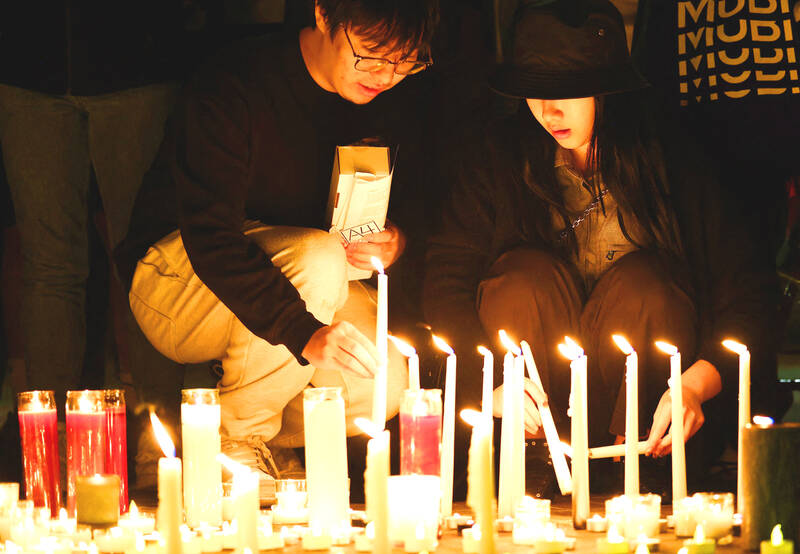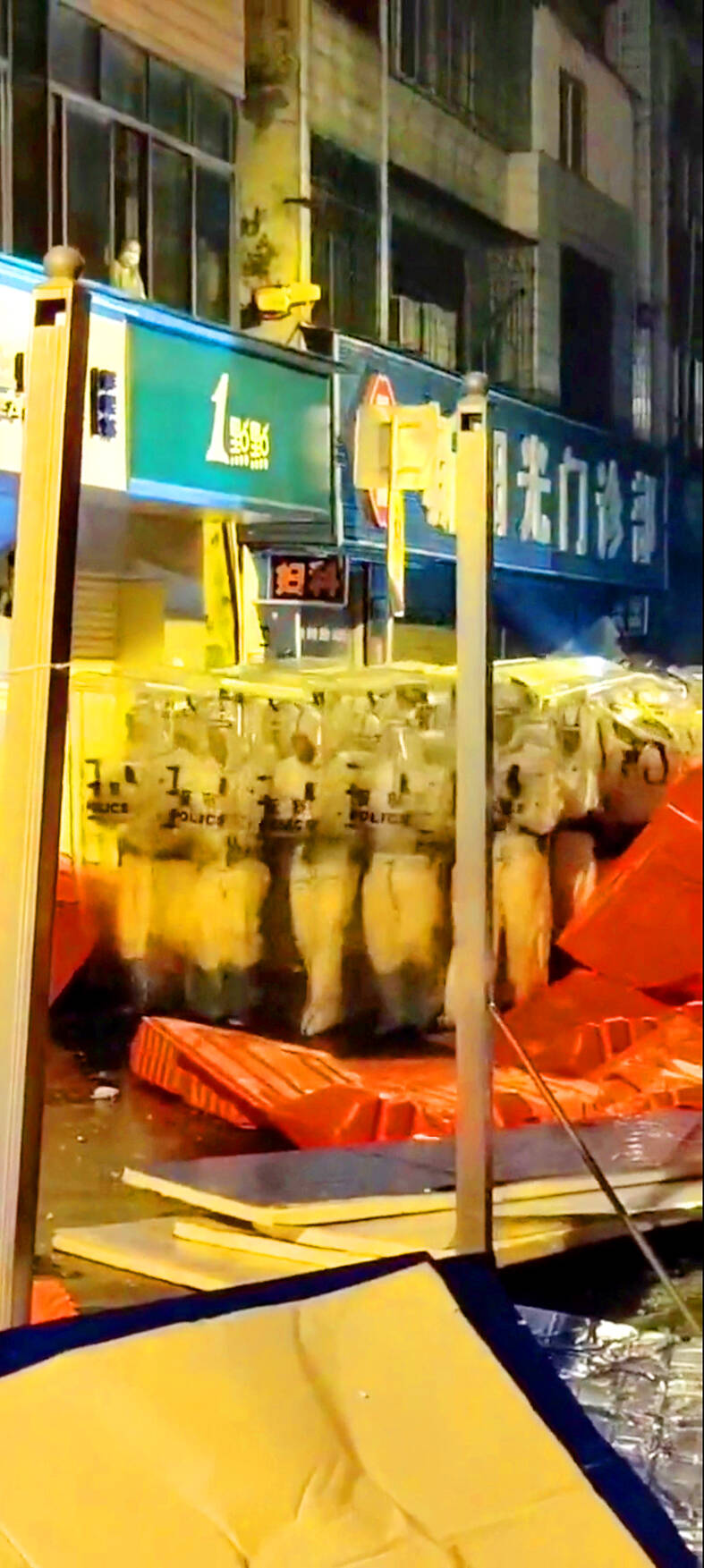Chinese students studying in the US on Tuesday held a candlelight vigil for the people killed in a blaze in an apartment in Xinjiang’s Urumqi, while protests continued in China yesterday against COVID-19 lockdowns, which have been blamed for the deaths, even though Beijing warned of a “crackdown.”
At the University of Southern California, students held candles and blank sheets of white paper while calling for Chinese President Xi Jinping (習近平) to step down and chanting: “Down with the Chinese Communist Party [CCP].”
One of the students, who gave his name as Jason, told reporters: “I would feel ashamed if I did not take a stand,” referring to his relative safety overseas even as compatriots who spoke out at home faced the threat of arrest.

Photo: AFP
Beijing’s top security body on Tuesday warned that authorities would “crack down” on the protests in China, which erupted over the weekend across major cities and continued in Guangzhou on Tuesday night and into yesterday, according to witnesses and social media footage.
Security personnel in hazmat suits walked shoulder-to-shoulder, taking cover under see-through riot shields, on a street in Guangzhou’s Haizhu District as glass bottles smashed around them, videos posted on social media showed.
In the footage, people can be heard screaming and shouting as orange and blue barricades were pictured strewn across the ground.

Photo: Reuters
People are seen throwing objects at the police, and later nearly a dozen men are filmed being taken away with their hands bound with cable ties.
Jason said that freedom of speech is the greatest of human rights, as a society cannot advance if people cannot express their opinions.
No Chinese media, especially social networking platforms, are carrying stories on the protests, Jason said, adding: “This does not happen in a normal society.”
We are holding up blank pieces of paper to tell the world that “we want to express our mind, but we cannot,” he said, adding that the event has spread so fast because the younger generation in China has great expectations for freedom and democracy.
However, there is still a long road before freedom and democracy are implemented in China, he said.
Jason said he was familiar with the democratization processes in Taiwan, adding that the protests in China, like the 1979 Formosa Incident, are the beginning of a democratic movement.
We need more people to “wake up,” because it will take many years before a tipping point can be reached, he said.
Another Chinese student who gave her name as Xiao T said she was against Beijing’s “brutal” COVID-19 pandemic policies and wanted to pay her respects to those killed in the fire in Urumqi.
Xiao T said that a Chinese social media account of hers had been locked for three days just because of her posts, adding that the experience had disappointed her.
“I hope this movement will achieve something,” she said.
Another Chinese student who identified herself as Xiang Xiang said she hoped one day to meet the people “who are fighting for our freedom” and tell them of her support in person.
With our material wants satisfied, most of us are trying to meet our spiritual needs, Xiang Xiang said, adding: “For the younger generation, freedom of speech is indispensable.”
“When the people cannot express their opinions on the government’s policies, it is easy to experience a sense of disappointment in one’s country,” she added.
Separately, a member of the Hong Kong Forum in Los Angeles said that Hong Kongers have been waiting for the Chinese protests for 33 years.
Seeing so many Chinese students supporting democracy and protesting against the CCP is a morale boost for all Hong Kongers abroad, they said.

DAREDEVIL: Honnold said it had always been a dream of his to climb Taipei 101, while a Netflix producer said the skyscraper was ‘a real icon of this country’ US climber Alex Honnold yesterday took on Taiwan’s tallest building, becoming the first person to scale Taipei 101 without a rope, harness or safety net. Hundreds of spectators gathered at the base of the 101-story skyscraper to watch Honnold, 40, embark on his daredevil feat, which was also broadcast live on Netflix. Dressed in a red T-shirt and yellow custom-made climbing shoes, Honnold swiftly moved up the southeast face of the glass and steel building. At one point, he stepped onto a platform midway up to wave down at fans and onlookers who were taking photos. People watching from inside

A Vietnamese migrant worker yesterday won NT$12 million (US$379,627) on a Lunar New Year scratch card in Kaohsiung as part of Taiwan Lottery Co’s (台灣彩券) “NT$12 Million Grand Fortune” (1200萬大吉利) game. The man was the first top-prize winner of the new game launched on Jan. 6 to mark the Lunar New Year. Three Vietnamese migrant workers visited a Taiwan Lottery shop on Xinyue Street in Kaohsiung’s Gangshan District (崗山), a store representative said. The player bought multiple tickets and, after winning nothing, held the final lottery ticket in one hand and rubbed the store’s statue of the Maitreya Buddha’s belly with the other,

‘NATO-PLUS’: ‘Our strategic partners in the Indo-Pacific are facing increasing aggression by the Chinese Communist Party,’ US Representative Rob Wittman said The US House of Representatives on Monday released its version of the Consolidated Appropriations Act, which includes US$1.15 billion to support security cooperation with Taiwan. The omnibus act, covering US$1.2 trillion of spending, allocates US$1 billion for the Taiwan Security Cooperation Initiative, as well as US$150 million for the replacement of defense articles and reimbursement of defense services provided to Taiwan. The fund allocations were based on the US National Defense Authorization Act for fiscal 2026 that was passed by the US Congress last month and authorized up to US$1 billion to the US Defense Security Cooperation Agency in support of the

HIGH-TECH DEAL: Chipmakers that expand in the US would be able to import up to 2.5 times their new capacity with no extra tariffs during an approved construction period Taiwan aims to build a “democratic” high-tech supply chain with the US and form a strategic artificial intelligence (AI) partnership under the new tariffs deal it sealed with Washington last week, Taipei’s top negotiator in the talks said yesterday. US President Donald Trump has pushed Taiwan, a major producer of semiconductors which runs a large trade surplus with the US, to invest more in the US, specifically in chips that power AI. Under the terms of the long-negotiated deal, chipmakers such as Taiwan Semiconductor Manufacturing Co (TSMC, 台積電) that expand US production would incur a lower tariff on semiconductors or related manufacturing